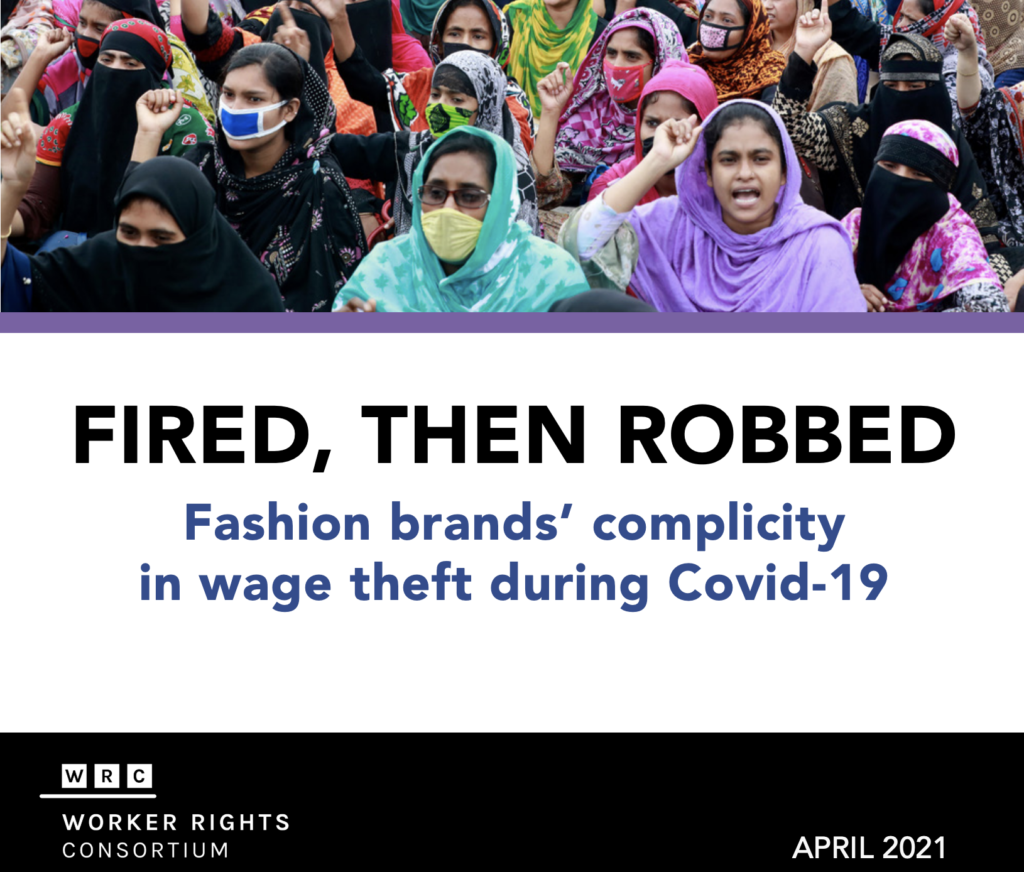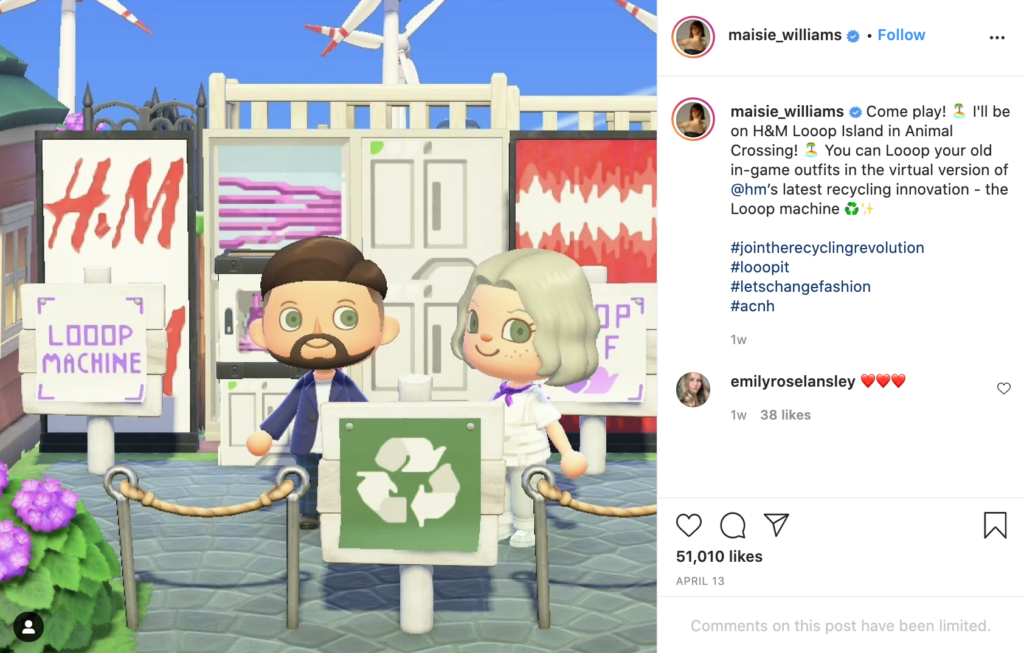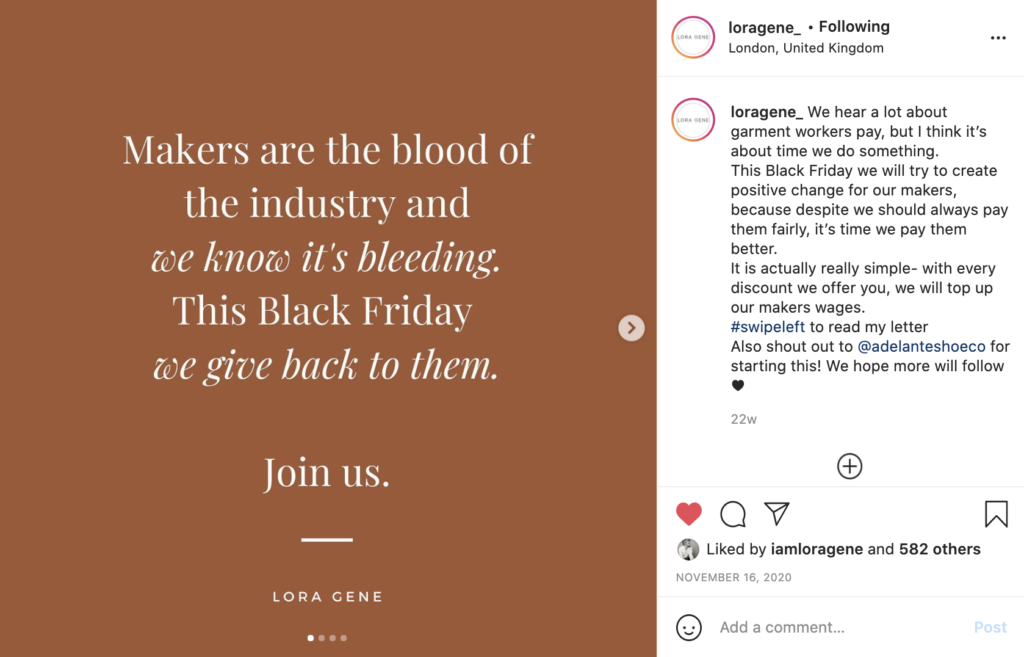The best sustainable and ethical menswear brands to add to your wardrobe
Lora Gene is founder of sustainable fashion brand Lora Gene.
It’s that time of the year again: everyone’s talking about a Fashion Revolution.
This year marks the 10th anniversary of Fashion Revolution.
But, what if I told you I’m sick and tired of seeing these platitudes plastered all over social media: the workers, the garments, transparency, ethically made, sustainable, sustainably sourced, recycled polyester, biodegradable materials, supply chain, eco-fashion consciousness…
Does that surprise you?
I’m sick of seeing these words used by the brands that created the problems in the first place and continue to profit from them.
I’m tired of seeing those same brands being called out by influencers and celebrities, then their token gestures promoted by influencers and celebrities. Their names dominating awards, forums, and sustainability conferences – the conversation.
Is this really progress, I ask myself? I want to take this opportunity to offer a different – perhaps not very popular – perspective. Here it goes, let’s see what you think…
“The truth is, however passionate we are about the work we are doing in the sustainability space, it’s not working. It’s not really changing anything. En masse, we are failing big time.”
ALL TALK, NO PROGRESS?
I’ve been working in the fashion industry for more than 10 years and sustainability is at the core of all my decisions – both creative and business.
As such, I’m becoming increasingly annoyed by the discrepancy between the actual issues and the ones communicated to the public.
There is an overwhelming amount of beautifully crafted information about the treatment and insulting pay levels of garment workers; well-articulated talks about the importance of recycling; emotionally charged infographics calling out greenwashing.
But, let me ask: what have we actually done to change this?
For all the talk, has anything actually changed? Are garment workers safer, better-protected, richer?
The reality is – not really.
In fact, during and since COVID practically the opposite is true. Garment workers are poorer, sicker and more unstable in their jobs – while corporations grow wealthier.

WHO MAKES MY CLOTHES?
While writing this, I opened the Clean Clothes Campaign news update, to see how easily I can back up these wild accusations with fact.
The headlines read:
Zara, Next, Mango Slammed for Leaving Workers Without Wages in Turkish Factory
Nike under fire over the sportswear giant’s three-year refusal to pay its garment workers
H&M, Nike and Primark use pandemic to squeeze factory workers in production countries even more
Live Frankly has recently reported on the economic performance of Nike, Zara and Primark.
So, why aren’t workers being paid?
It’s easy to point the finger at factory owners, but consider this:
Bulgaria, where I come from, is the second largest garment manufacturer in Europe. In Bulgaria, factory owners get about 5-7% of the retail price. That means if you buy something for £50, they get between £2.5 – £4 for making that product.
Three years ago, the average wage of a garment worker was 600 Bulgarian Leva, just under €300 per month, for a 12 hour day.
Today, this has increased to around 1000 Bulgarian Leva, or about €500 and people are treated more fairly. This is partly because there is less fast fashion and therefore less pressure from fast fashion brands on factory owners and workers.
But, still, would you work a 12-hour day for €500?
Is it any wonder in the article Fashion victims: Bulgaria’s textile workers on the poverty line one worker was quoted as saying:
“I felt like a machine, really, like a machine. You come home from work, you eat, you sleep three or four hours. I felt broken… as if huge rocks were bent on top of my back.’’
This is Who Makes Your Clothes. Right here. This is exploitation in Europe.
The question we should also be asking is: Who Makes Profits from My Clothes?
THE MYTH OF REDUCE, REUSE, RECYCLE
Reduce, Reuse, Recycle – a catchy slogan, right?
But, has this made a difference to how much we make and buy?
Not according to the stats.
People are buying more clothes than ever, which means brands are making more clothes than ever.
More than two tonnes of clothes are bought in the UK market every minute and we win top spot in Europe – for buying more clothes than any other country, according to a BBC article. Even more scary is that our shopping habits are predicted to continue to rise, with the current figures doubling by 2050.
Not a problem, because as brands love to tell us, we can recycle all of this, right?
Not quite; currently, we recycle a paltry 12% of clothes. And I’ll bet you that Adidas trainers made with Recycled Content make up even a smaller percentage of their overall product output.
Practically-speaking, it’s complex, expensive and totally inefficient to separate material blends. And, there’s rumours that factories are making plastic bottles actually to keep up with brand demand for (the right kind) of recycled plastics. But, that’s a story for another time.
It all feeds into explaining why – to put to politely – three years ago I was skeptical about The H&M X Maisie Williams “Looop it” campaign, encouraging people to shop (new garments made out of recycled fabrics) ‘guilt-free’.

‘’Loop your clothes for a better fashion future,’’ said Williams in the fanciful video promo.
And, here’s the reality today:
Since 2013 H&M has collected 172,700 tonnes of textiles for recycling in total.
From this, they say that 68% of the textiles collected in stores were resold, 24% repurposed or recycled and 8% were disposed prioritising incineration to recovery energy.
It’s estimated that H&M churn out around 3 billion garments a year.
Assuming the average weight of a garment is around 400 grams, this equates to around 1.2 million tonnes of clothing.
Plus, in 2018, it was estimated that H&M were sitting on $4.3 billion worth of unsold stock. I wonder what that figure is this year?
Those maths don’t quite add up to me. Do they to you?
ENOUGH TALK, MORE ACTION…
But, what do we do with all that information? Post it on Instagram for some likes?
I’m arguing that’s no longer enough. We know the culprits. We know the issues. It’s time we fix them.
The truth is, however passionate we are about the work we are doing in the sustainability space, it’s not working. It’s not really changing anything. En masse, we are failing big time.
So, how do we up our game?
Articles like this on their own are not going to solve this problem. We need people to do the hands on work. We need people willing to get their hands dirty – in the best way.
It’s a much bigger ask. So, I’ll put my money where my mouth is, and spend the rest of this article making some practical suggestions on what I think more action could look like:
Brands:
Change your business model, don’t structure it entirely on waste and exploitation.
Let’s stop pretending the global market self-regulates; it’s a lie you tell yourself while profiting from modern slavery. Create mutually-beneficial relationships with your suppliers.
Also, let’s move beyond the myth of ‘economies of scale’. Your scale is f*cking up the planet. Slow down. Fast.
Designers:
Dear designers, do you design newness for newness sake? Why are we designing with recycling in mind? Why aren’t we creating clothes that could potentially stay with our customers for decades?
We are perfectly aware that waste is a design flaw. Let’s design better.
While we’re on this point, it shouldn’t be for the consumer to have to ask who made their fabric. That’s our role. I know who makes mine, do you know who makes yours?
Another revolutionary idea, instead of simply outsourcing, why not make your factory a partner? Give them a share of your company, or incentivise them with a bonus system and design your business plan around increasing their income, too. We’ve been doing this for years with our the Black Friday discount share…

Influencers and culture shapers:
You too can collaborate. Work together to campaign for much-needed legislative change. After decades of brands’ good intentions, we know this is no longer enough.
Perhaps, dedicate some of your space for the small brands you believe in, and create partnerships with them.
If brands can’t afford a fee, perhaps ask them a cut of sales. Make your business relationship transparent and hold them accountable.
Imagine if as well as using your space to criticise H&M, Zara, and Boohoo you partner with three good brands with great products and help each other to raise awareness of alternative solutions? I still do this with Aja Barber.

Sustainability advocates, campaigners, intrapreneurs etc:
Ditto. Work together to campaign for much-needed legislative change. After decades of brands’ good intentions, we know this is no longer enough.
Also, what if we start to share the budget we spend on sustainability reporting, slogans and content creation on training the next generation or trialling localised solutions on small scales?
I can’t find one incubator that doesn’t tout the ‘more is better’ story. There certainly aren’t enough that don’t reinforce the narrative that the Global North has the best ideas about how to solve problems in the Global South.
Let’s put our time, energy and efforts where our brilliant ideas are. We can learn from our failures and invest the profits in replicating our success.
Entrepreneurs:
If you don’t succeed in creating your own valuable product, don’t quit.
Reuse your expertise, collaborate with others, maybe you can create a powerful eco-system that elevates the niche you are working in. I have helped 15 other brands to source better and improve their supply chain, over the past three years. I am one person.
Everyone reading this article:
I expect this article to receive criticism and I would like to hear your views, honestly. But, I have a modest request from those that do get in touch. Please, don’t just critique me and my ideas but also conceive your own.
Clothing used to be a currency; garment workers used to have value; fibres used to support local communities’ livelihoods.
Share your ideas. But, most importantly, action your ideas.


